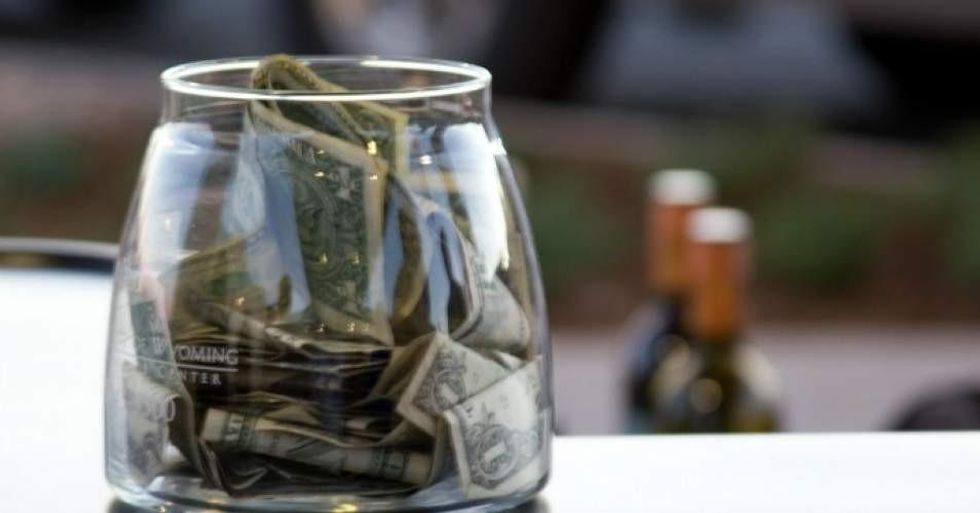Trump 'Tip Stealing' Rule Would Cost Workers $5.8 Billion Per Year: Report
"For this administration, anything that gives power to working people needs to be punished."

President Donald Trump's war on workers has spawned a number of disastrous policy moves, from cuts to federal employees' pay increases to directives making it harder for workers to unionize. But one of the "nastiest" policy shifts Trump is pursuing is a rule that would allow companies to steal their employees' tips--which, according to a new report, would cost workers $5.8 billion a year.
Published by the Economic Policy Institute (EPI) on Wednesday, the analysis also details the disproportionate impact the proposed rule would have on women, whose tips would account for nearly 80 percent--$4.6 billion--of the total stolen by employers.
\u201cFor this administration, anything that gives power to working people needs to be punished. So tip stealing is on the road to approval by the Trump administration. The @EconomicPolicy Institute estimates a total heist of $5.8 billion\u2014$4.6bn of that from women.\u201d— Ben Wikler (@Ben Wikler) 1516212432
\u201cTrump to bosses: we'll no longer consider it stealing if you take $5.8 billion from restaurant workers' tips. New study of legalized tip stealing via @hshierholz @metaCoop @EconomicPolicy https://t.co/PtNicocg3c\u201d— Amy Traub (@Amy Traub) 1516197760
By contrast, the "tip stealing" rule--introduced by the Department of Labor in December--"would be a windfall to restaurant owners and other employers," who would essentially have total control over workers' tips, as long as they pay the minimum wage, EPI finds.
While EPI notes that employers would have the option to redistribute the tips to "'back of the house' workers like dishwashers and cooks," they would not be required to do so.
"Employers would be no more likely to share tips with back-of-the-house workers than they would be to make any other choice about what to do with a business windfall, including using the money to make capital improvements to their establishments, to increase executive pay, or to line their own pockets," EPI's report notes.
"Instead of giving workers a badly needed boost to their paycheck, the Trump administration is actively making it legal to steal tips from working people," Heidi Shierholz, EPI's director of policy, concluded in a statement on Wednesday.
With the rule's public comment period ending in just over two weeks, activists urged Americans to flood the Department of Labor with outrage that could help set the stage for future lawsuits.
\u201cSpread the word, but also do more. This proposed rule is open to public comment. Your comment is unlikely to change the immediate outcome, but if the admin doesn't address public input in its final rule, that creates space for lawsuits later. So: weigh in! https://t.co/dks8duNyEH\u201d— Ben Wikler (@Ben Wikler) 1516212432
An Urgent Message From Our Co-Founder
Dear Common Dreams reader, The U.S. is on a fast track to authoritarianism like nothing I've ever seen. Meanwhile, corporate news outlets are utterly capitulating to Trump, twisting their coverage to avoid drawing his ire while lining up to stuff cash in his pockets. That's why I believe that Common Dreams is doing the best and most consequential reporting that we've ever done. Our small but mighty team is a progressive reporting powerhouse, covering the news every day that the corporate media never will. Our mission has always been simple: To inform. To inspire. And to ignite change for the common good. Now here's the key piece that I want all our readers to understand: None of this would be possible without your financial support. That's not just some fundraising cliche. It's the absolute and literal truth. We don't accept corporate advertising and never will. We don't have a paywall because we don't think people should be blocked from critical news based on their ability to pay. Everything we do is funded by the donations of readers like you. Will you donate now to help power the nonprofit, independent reporting of Common Dreams? Thank you for being a vital member of our community. Together, we can keep independent journalism alive when it’s needed most. - Craig Brown, Co-founder |

President Donald Trump's war on workers has spawned a number of disastrous policy moves, from cuts to federal employees' pay increases to directives making it harder for workers to unionize. But one of the "nastiest" policy shifts Trump is pursuing is a rule that would allow companies to steal their employees' tips--which, according to a new report, would cost workers $5.8 billion a year.
Published by the Economic Policy Institute (EPI) on Wednesday, the analysis also details the disproportionate impact the proposed rule would have on women, whose tips would account for nearly 80 percent--$4.6 billion--of the total stolen by employers.
\u201cFor this administration, anything that gives power to working people needs to be punished. So tip stealing is on the road to approval by the Trump administration. The @EconomicPolicy Institute estimates a total heist of $5.8 billion\u2014$4.6bn of that from women.\u201d— Ben Wikler (@Ben Wikler) 1516212432
\u201cTrump to bosses: we'll no longer consider it stealing if you take $5.8 billion from restaurant workers' tips. New study of legalized tip stealing via @hshierholz @metaCoop @EconomicPolicy https://t.co/PtNicocg3c\u201d— Amy Traub (@Amy Traub) 1516197760
By contrast, the "tip stealing" rule--introduced by the Department of Labor in December--"would be a windfall to restaurant owners and other employers," who would essentially have total control over workers' tips, as long as they pay the minimum wage, EPI finds.
While EPI notes that employers would have the option to redistribute the tips to "'back of the house' workers like dishwashers and cooks," they would not be required to do so.
"Employers would be no more likely to share tips with back-of-the-house workers than they would be to make any other choice about what to do with a business windfall, including using the money to make capital improvements to their establishments, to increase executive pay, or to line their own pockets," EPI's report notes.
"Instead of giving workers a badly needed boost to their paycheck, the Trump administration is actively making it legal to steal tips from working people," Heidi Shierholz, EPI's director of policy, concluded in a statement on Wednesday.
With the rule's public comment period ending in just over two weeks, activists urged Americans to flood the Department of Labor with outrage that could help set the stage for future lawsuits.
\u201cSpread the word, but also do more. This proposed rule is open to public comment. Your comment is unlikely to change the immediate outcome, but if the admin doesn't address public input in its final rule, that creates space for lawsuits later. So: weigh in! https://t.co/dks8duNyEH\u201d— Ben Wikler (@Ben Wikler) 1516212432

President Donald Trump's war on workers has spawned a number of disastrous policy moves, from cuts to federal employees' pay increases to directives making it harder for workers to unionize. But one of the "nastiest" policy shifts Trump is pursuing is a rule that would allow companies to steal their employees' tips--which, according to a new report, would cost workers $5.8 billion a year.
Published by the Economic Policy Institute (EPI) on Wednesday, the analysis also details the disproportionate impact the proposed rule would have on women, whose tips would account for nearly 80 percent--$4.6 billion--of the total stolen by employers.
\u201cFor this administration, anything that gives power to working people needs to be punished. So tip stealing is on the road to approval by the Trump administration. The @EconomicPolicy Institute estimates a total heist of $5.8 billion\u2014$4.6bn of that from women.\u201d— Ben Wikler (@Ben Wikler) 1516212432
\u201cTrump to bosses: we'll no longer consider it stealing if you take $5.8 billion from restaurant workers' tips. New study of legalized tip stealing via @hshierholz @metaCoop @EconomicPolicy https://t.co/PtNicocg3c\u201d— Amy Traub (@Amy Traub) 1516197760
By contrast, the "tip stealing" rule--introduced by the Department of Labor in December--"would be a windfall to restaurant owners and other employers," who would essentially have total control over workers' tips, as long as they pay the minimum wage, EPI finds.
While EPI notes that employers would have the option to redistribute the tips to "'back of the house' workers like dishwashers and cooks," they would not be required to do so.
"Employers would be no more likely to share tips with back-of-the-house workers than they would be to make any other choice about what to do with a business windfall, including using the money to make capital improvements to their establishments, to increase executive pay, or to line their own pockets," EPI's report notes.
"Instead of giving workers a badly needed boost to their paycheck, the Trump administration is actively making it legal to steal tips from working people," Heidi Shierholz, EPI's director of policy, concluded in a statement on Wednesday.
With the rule's public comment period ending in just over two weeks, activists urged Americans to flood the Department of Labor with outrage that could help set the stage for future lawsuits.
\u201cSpread the word, but also do more. This proposed rule is open to public comment. Your comment is unlikely to change the immediate outcome, but if the admin doesn't address public input in its final rule, that creates space for lawsuits later. So: weigh in! https://t.co/dks8duNyEH\u201d— Ben Wikler (@Ben Wikler) 1516212432

